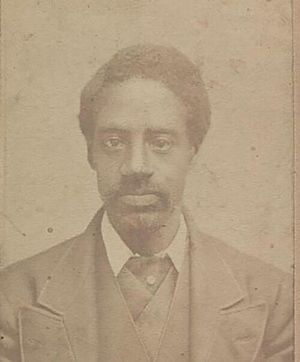Samuel Harrison (minister) facts for kids
Samuel Harrison (born in 1818 – died August 11, 1900) was an important African American leader. He was born into slavery but became free. He worked as a preacher and later served as a chaplain in the Army during the American Civil War. Samuel Harrison lived mostly in the New England area. He was a strong voice against slavery and unfair treatment of Black people. He even convinced President Abraham Lincoln to make sure Black chaplains earned the same pay as white chaplains.
Contents
Early Life and Education
Samuel Harrison was born into slavery in 1818 in Philadelphia, Pennsylvania. He and his mother became free in 1821. When he was a young man, he worked for his uncle as a shoemaker. But Samuel felt a strong calling to become a minister, someone who leads a church.
He started his education at the Peterboro Manual Labor School in Peterboro, New York. This school closed soon after he arrived. The school's founder, Gerrit Smith, suggested he move to Western Reserve College and Preparatory School in Hudson, Ohio. Samuel studied there from 1836 to 1839 and graduated. During this time, he married his childhood sweetheart, Ellen Rhodes. They had 13 children together. After his studies, he became a minister and started working at the Second Congregational Church in Pittsfield, Massachusetts.
Serving in the Civil War
In 1862, Reverend Harrison left his church to help people during the American Civil War. He worked for the National Freedman's Relief Society. This group helped formerly enslaved Black people on the sea islands of Georgia.
In July 1863, the 54th Regiment Massachusetts Volunteer Infantry led a brave attack on Fort Wagner in Charleston, South Carolina. This was a very important moment because the 54th was the first all-Black unit in the Union Army. They faced heavy losses in the battle. The Governor of Massachusetts, John Albion Andrew, sent Reverend Harrison to South Carolina to show support for the soldiers of the 54th Regiment.
Fighting for Equal Pay
Later that year, Reverend Harrison became a chaplain for the 54th Regiment. A chaplain is a minister who serves in the military. He was one of only 19 African American chaplains during the Civil War. While serving, Reverend Harrison noticed that Black chaplains were paid less than white chaplains. He believed this was unfair and spoke out against it.
Because he was friends with Governor John A. Andrew, Samuel Harrison had a chance to make a difference. Governor Andrew wrote a letter to President Lincoln, explaining the unfair pay and mentioning Reverend Harrison's experience. Less than a year later, in 1864, President Lincoln made the pay equal for all chaplains, no matter their race.
Reverend Harrison left the Army in 1864 due to health reasons. He continued to work for the National Freedman's Relief Society until the war ended.
Life After the War and Legacy
After leaving the Army, Reverend Harrison continued his work as a minister. He served in several churches across Rhode Island, Massachusetts, and Maine. During this time, he wrote many articles speaking out against racism and for equal rights during the period known as Reconstruction.
He wrote his life story, called Rev. Samuel Harrison: His Life Story, which was printed in 1899. In 1872, he returned to be the pastor of the Second Congregational Church of Pittsfield again. He also had three of his sermons published. Samuel Harrison passed away on August 11, 1900, in Pittsfield, the same city where he began his ministry. His house in Pittsfield, known as the Samuel Harrison House, was recognized as a historic site in 2006.
See also
Memorial Tablet
A special tablet was placed in the Second Congregational Church in Pittsfield to remember Samuel Harrison:
In Memory of the Reverend Samuel Harrison, 1815-1894. Ordained and Settled over this Church as its First Minister, 1850-1862. Again its Minister from 1872 until his death. Member of the Association of Congregational Ministers of Berkshire County for Forty Years. Chaplain 54th Massachusetts Volunteers, 1862. A Wise Leader, an Honored Citizen, an Ardent Patriot, a beloved Messenger of the Lord, he wrought well for his People, his Country and his God. I have Fought a good Fight. I have finished my Course. I have kept the Faith. Henceforth, there is laid up for me a crown of Righteousness.
|
 | John T. Biggers |
 | Thomas Blackshear |
 | Mark Bradford |
 | Beverly Buchanan |


